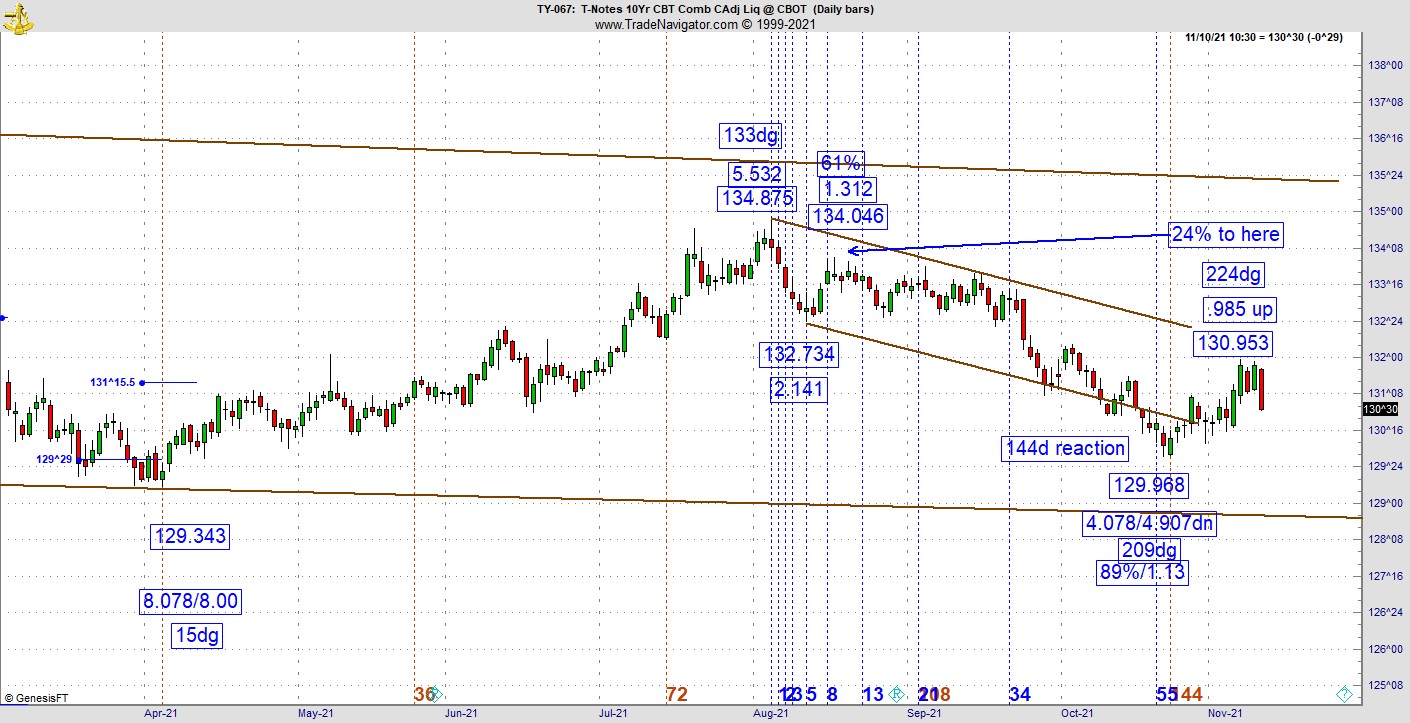When MoneyShow CEO, Kim Githler, made her opening remarks at the Las Vegas Traders Expo 2018, I estimated the crowd in the ballroom was around 2000 attendees, recalls Jeff Greenblatt of Lucas Wave International.
She asked them how many had five years of trading experience or less. Roughly 75% of the hands in the room went up. Recall, the market tanked during this period and on that particular day, the Dow was down over 600 points. The next question she asked was how many were prepared to deal with the selloff going on.
Only a handful of traders raised their hands. It’s not a mystery, most of those developing traders had never experienced a bear phase. Trading is one of the most complex professions to learn, and Gann stated it would take 10 years of study before a person was ready to trade with real money. Well, a lot has changed since Gann’s day. He never had the technology we have, so he couldn’t shorten the learning curve. All patterns are very similar, and the only thing that’s different is the time frame. For example, the day session of the E-mini is roughly 104-5min bars, so one could actually cover a whole year’s worth of bars in only two-and-a-half days. By that logic, you can cover 10 years of data in only 25 days.
The moral to the story is that we don’t need to wait 10 years, but we must understand that even achieving competence, no less mastery, is a process that takes time. We are going to look at that process. What I’ve noticed over the years is the development of a trader is very similar to that of a professional athlete or sports team.
Before we get to that, a quick look at the chart of the week. The headline on Wednesday morning at CNBC was, “US consumer prices jump 6.2% in October, the biggest inflation surge in more than 30 years.” Are you surprised? Right now, the supply chain issue is nowhere near resolution, so inflation is suddenly leaning toward becoming structural, not transitory.

Even the Ten Year is getting into the act. The bond market has been up since October 21, based on a 144-day Fibonacci reaction. Now its threatening to break down, and in the very least it is retesting the low. Suddenly, the pattern stalled at the 224dg vibrational day on the Gann calendar, and by itself that doesn’t mean too much. But when we realize the stall hit at the 24% retracement of the secondary high, that explains Wednesday’s huge red bar. If the 144-day low refuses to hold, we might be talking about inflation in the cost of borrowing money in the not-too-distant future.
I’ve been using sports analogies to explain the development of a trader for years. In this space we’ve talked about Bill Belichick, Kobe Bryant, and Wayne Gretzky, to name a few. These greats have distinguished themselves because of their total commitment to preparation.
This week, I saw a great example in real time. Let me just suggest to you that learning how to win is a process that takes time, more time than most people realize. Big losers who fire the coach and change players suddenly lose small, and then grow into winning small before they can challenge for the playoffs or championship. Winning is a learned skill. In Malcolm Gladwell’s bestseller, Outliers, he spends a whole chapter describing The Beatles training ground in Hamburg, Germany, where they played eight hours a night, seven days a week. Philip Norman wrote The Beatles biography called Shout. He stated that when they went to Hamburg, they weren’t very good onstage; but when they came back to England, they were very good. Norman said the following, “They learned not only stamina. They had to learn an enormous amount of numbers, cover versions of everything you can think of, not just rock and roll, a bit of jazz too. They weren’t disciplined onstage at all before that. But when they came back, they sounded like no one else, it was the making of them.” Achievement is talent plus preparation.
In trading, most of us go through a few bankrolls and have to reinvent ourselves before we start winning. Even when we learn good strategies, we must learn to trust it when the market gets very emotional, which is just about every day. So, with that in mind, let’s do a case study on the New York Rangers.
You are probably wondering what the NY Rangers have to do with trading? You might be surprised. Let me explain. This is a very young and talented team. They are a mixture of youth and veterans who are playing together for the first time, and there is a new coach. As with trading, there is a way to play winning hockey. They did well until the recent Western Canada trip, where the level of competition was raised several notches.
As far as winning trading is concerned, most of us learn by trial, error, and a lot of losing. The only way we change, and grow, is to learn there is a path to becoming a winning trader. Investing in your education is the key. This is a process that takes years. The Rangers were good enough to get a 2-0 lead in Vancouver, before blowing it and losing in overtime. During the next game in Edmonton, which features two of the best players in the world, the Rangers were good enough to go up 4-1 before blowing that lead.
Here’s the first takeaway. While the Rangers were good enough to get a nice lead, they weren’t good enough to hold it. Does that sound familiar? They couldn’t stand prosperously because they suddenly played not to lose, as opposed to doing what got them ahead in the first place. Why did their approach to the game change? It’s clearly psychological.
Many of you are a lot better than you realize. Many intermediate level traders are good enough to get ahead in trades, but for some reason give back those gains.
Most of the commenters on the hockey page were criticizing the Rangers for ultimately losing those games. They missed the point entirely. Losing is one thing, but it’s important to understand why you are losing. Why is it so many of us make better trades after we lose the first one of the day? Being prosperous requires a different mindset. Some people, for whatever reason, have a hard time accepting their own prosperity.
The next game, they were down 3-0, and before you knew it was 6-0. Do you listen to postgame interviews? The players will tell you exactly what happened. Chris Kreider told the media when the score hit 3-0, they stopped following their system and “the wheels fell off the wagon.” A you getting emotional about certain market conditions and fear the train is leaving the station without you? You need to stay with your strategy and not try to get back losses too quickly.
Are you following a system you can trust? Do you have strategies to deal with different market conditions? Do you find yourself getting ahead in trades but either stay too long and give it back or fear your small gains will be taken back so you exit prematurely? These are all psychological pitfalls on the path to consistency.
While it’s true that anyone can put on a winning trade, if you have a good strategy and find yourself getting ahead in the trade, do you panic at the first adversity you face? Perhaps you used to have that problem, but were able to rise above it. See, the Rangers were good enough to get ahead but at that point, they couldn’t deal with prosperity.
You might laugh, but lots of people have trouble with winning. Why do you think most lottery winners are broke several years later? What I’m trying to explain is, if you have the capability of consistently getting ahead in trades, but don’t have much to show for it, you are actually better than you realize. All you have to do is exhibit the same level of discipline that got you the lead in the first place. Stay with your plan whether you are ahead or behind.
The net result for the Rangers? On Monday night they played Florida, which set a record for the best 11-game start in NHL history. This time, the Rangers built a 4-0 lead, and the same thing almost happened again. Florida closed to 4-3 before the Rangers finally won. So, they are learning. The process in keeping a lead in hockey means making the other team work hard for their offense, while at the same time not sitting back trying to run out the clock. I would imagine by the end of the season, this team will have learned its lesson.
Where does this leave you and me? If you are good enough to consistently get ahead in your trades, all you might need to do is realize shake outs (which happen in every time frame) are part of the game, and you shouldn’t panic. What I’ve learned over time is I could be more profitable by doing nothing. In my development years I learned the hard way, by leaving a fortune of money on the table, that all I should’ve done was nothing to keep it.
There could be many takeaways to a discussion like this, but if you continue to manage the trade exactly the way you got ahead in the first place, you may find you’ll be keeping more of those profits. This won’t happen overnight. For every time you get shaken out, pay close attention to the action, and see what happens after you exit. How many of those times did you leave too much money on the table? How many times did your early exit profit you? If you are not where you want to be, don’t beat yourself up. Winning is a process and it takes careful discipline and observation to get to that next level. Listen to your coach, not the commenters.
For more information about Jeff Greenblatt, visit Lucaswaveinternational.com.











